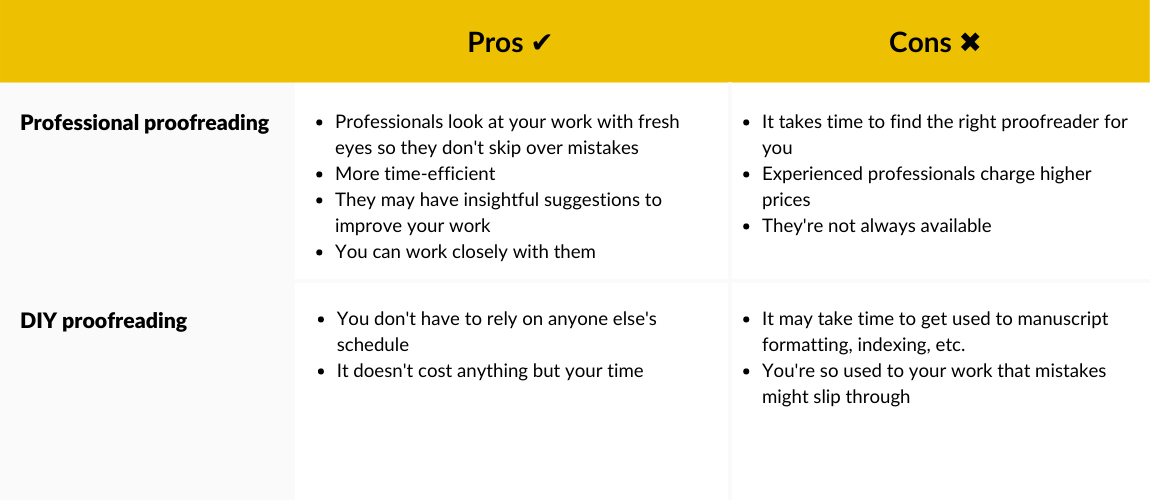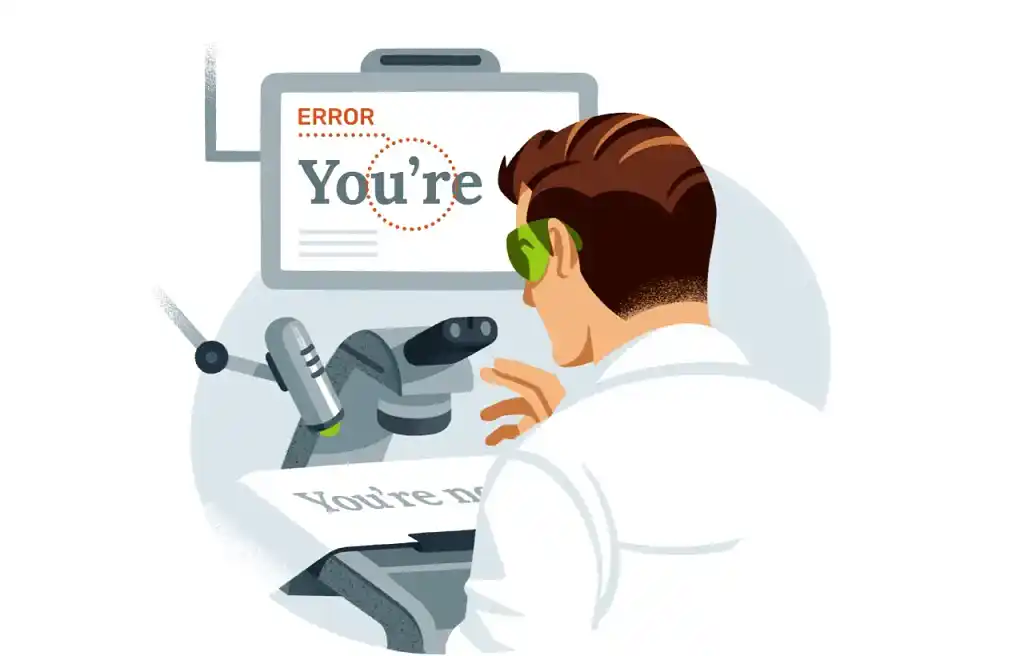Blog • Understanding Publishing
Last updated on Oct 15, 2025
What is Proofreading? Beginner's Guide to an Essential Edit
Martin Cavannagh
Head of Content at Reedsy, Martin has spent over eight years helping writers turn their ambitions into reality. As a voice in the indie publishing space, he has written for a number of outlets and spoken at conferences, including the 2024 Writers Summit at the London Book Fair.
View profile →Whether you’re a student, a mechanic, a doctor, or a professional writer, you’ve probably come across proofreading in some form or another — though you might not be aware of it. So much of the work people do these days revolves around the written word. Mistakes in their writing can have a massive impact on their success — which is where proofreading comes in!
In this post, we’ll have a look at the ins and outs of proofreading, from the perspective of experienced proofreaders in the publishing trade.
What is proofreading?
Proofreading is the act of reading written work and marking any errors. These mistakes most commonly involve spelling, grammar, punctuation, and consistency.
What is a proof?
The ‘proof’ in ‘proofreader’ comes from the publishing term describing an early printed copy. Traditionally, typesetters would arrange letter tiles onto large plates that are then used to print pages of a book. But before they started churning out thousands of copies, a ‘proof’ version was sent to the publisher for a final check.
With modern digital publishing (and computerized printing methods), proofreading is now usually done on a computer — though some proofreaders still prefer marking up physical copies.
What is the difference between proofreading and editing?
In publishing, proofreading comes into play at the very end of the editorial process, after a manuscript has been corrected by a copy or line editor. The proofreader’s job is to comb through the document and look for any mistakes that may have slipped through the cracks. Regardless of how meticulous the writer and editor have been, there will almost always be errors when dealing with a book of 80,000 words or more.

If you'd like to confirm which type of editing your book needs at its current stage, we recommend taking this quick quiz to find out:
🖋️
What kind of editing does your book need?
Takes one minute!
Why is proofreading important?
You might remember, in early 2019, the television hit series Game of Thrones was coming to an end. Devoted and casual fans alike sat in front of screens to devour every moment of the final season. So it’s no surprise that when a Starbucks cup made an accidental cameo during one of the episodes, viewers were pointing out the gaff on social media in a heartbeat.
The show’s producers were quick to act, and 48 hours later, the disposable cup had been edited out of the show. Yet there’s no denying that hundreds, if not thousands, of viewers were yanked from the medieval realm of Westeros because of this tiny appearance of a modern artefact. Suddenly, the focus is on the error, and not the story.
Do you see where we’re going with this? A manuscript peppered with typos, grammatical errors, or contextual inconsistencies will jolt a reader out of the narrative the book is meant to tell. Instead of getting caught up in the story or thesis, they’re suddenly forced to mentally rectify the work’s mechanical mistakes. So proofreading is partly important because it allows your narrative to shine through uninterrupted.
What’s more, it adds a level of professionalism that is absolutely necessary if you’re looking to get publishers or readers on your side. When confronted with an obviously un-proofed book, both audiences will likely assume the author couldn’t be bothered to truly invest in their work. And if the author didn’t seem bothered to invest, why should they?
So whether you’re planning to seek out traditional representation for your book or to publish on your own, editing and proofreading is a vital part of the publishing process.
Q: When is a proofreader necessary after a copy edit, and how does this process differ from the editing phase?
Suggested answer
Proofreading doesn’t mean the copyeditor failed—it means the publishing process is working as it should.
At the Big Five publishers, where I’ve proofread re-releases of bestselling books that had already undergone professional editing and sold millions of copies, I’ve still found hundreds of errors—sometimes over 700 in a single manuscript. Even the most skilled editors miss things. That’s why industry-leading publishers invest in multiple rounds of editing—developmental, copyediting, slugging, proofreading, and cold reading.
For indie authors, budget often determines how many of these stages are possible. If you can only choose one, a solid copyedit can get your manuscript into excellent shape. But when feasible, combining copyediting and proofreading gives your book the clarity, consistency, and polish it needs to make a strong first impression.
Ian is available to hire on Reedsy ⏺
A copyeditor is there to look at the style and tone of the work. They're traditionally wrestling with a house style guide or an academic style guide so the writer's work fits the industry standard. This is the person who polishes the writer's work – using industry knowledge writer's can't be expected to have – and gets it ready to be turned into a book. When the copyeditor's focus is on the whole of the manuscript (to note the jokes you made before, the colour of the character's eyes, and the weather outside in chapter three) it's not always possible to focus on commas too.
Proofreading should be the very final safety net, there to catch the last typos and act as a different set of eyes. They're able to concentrate on the very final detail of the text because the copyeditor resolved the vast majority of the glaring issues.
The most important thing, though, is that the proofreader should be reading the proofs. They're the person who checks the book professionally just before it goes to print, and checking for all the potential problems that were created when your manuscript went from a Word document to a PDF. When you remove the proofreader from the process, you risk all kinds of gremlins impacting the final version of your book and the impression it makes.
Mairi is available to hire on Reedsy ⏺
A copy-editor often has to pay a lot of attention to wider issues, and hence may miss some small proofreading errors or inconsistencies. Also, in the publishing context, when a book has been typeset, the typesetting process often introduces errors into a book that weren't there before
John is available to hire on Reedsy ⏺
It doesn’t mean the copy editor has failed if a proofreader is needed. Even the best copy editors aren’t perfect—no one can catch every single error. The industry standard for copy editing is a 90-95% catch rate, which is impressive, but it still leaves room for minor typos or formatting issues to slip through. That’s why a final proofread is essential; it provides a fresh set of eyes to catch anything that might’ve been missed and ensures the formatting and presentation are clean and consistent for a polished, professional result.
Eilidh is available to hire on Reedsy ⏺
The distinctions between copyediting and proofreading can grow fuzzy at times, but essentially, copyediting happens before design and proofreading, after. Even if your copy editor were perfect, turning an error-free manuscript into a book is going to introduce new elements that need to be checked. Are the margins consistent? Are all the headers the right level? Did a quotation mark of the wrong font sneak in? Are the page numbers on the correct side of the page? Even if they never actually speak with one another, the copyeditor, designer and proofreader engage in a sort of conversation to ensure the author's intentions get onto the page.
Eric is available to hire on Reedsy ⏺
Working with a professional proofreader
A professional proofreader does more than just look out for spelling, grammar, and punctuation mistakes. They will also look for consistency issues that could hamper the reading experience. This would include:
- Ensuring that any web links go to the right webpage
- Checking that the index matches the content
- Confirming that the layout doesn’t fluctuate throughout the work
- Making sure that the images have correct captions
- Verifying that the copy adheres to the author’s chosen style guide
Proofreaders will not usually copy-edit, meaning that they won't make changes directly to the manuscript. Their primary job is highlighting potential mistakes, allowing the writer or editor to make the final decision.
Who should use professional proofreading?
In traditional publishing, every book will be proofed before it’s released to the public. If a reader were to find more than a handful of typos or grammatical mistakes in a novel, for example, it could negatively color their reading experience (and damage the publisher’s reputation).
In self-publishing, proofreading is becoming a non-negotiable part of the editorial process. Independent authors often look for ways to reduce their costs, so they’re often tempted to proofread by themselves. But as the indie book market grows and its products improve in quality, getting a professional proofread quickly becomes common practice.

Outside of trade publishing, proofreaders will often find work in areas such as academia, journalism, and even advertising. In some corporate settings, they can even be hired to check through slide decks before presentations.
Q: How are human proofreaders different from proofreading tools like Grammarly?
Suggested answer
The problem with relying on any piece of editing software is twofold: 1) They tend to only catch a fraction of issues in a piece of writing, and 2) In my experience, the vast majority of what they suggest is flat-out wrong or misguided. When I used to double-check things by running them through Grammarly, I’d spend most of the time sifting through suggestions that would actually add errors and clunky language to a manuscript rather than fixing them. That’s why I recommend letting an editor figure out what’s useful and what’s not, rather than having to sort through it and figure it out yourself!
These days, of course, most people asking this question are asking more about generative AI tools than “traditional” editing software like Grammarly and ProWritingAid (and indeed, those companies have also embraced dubious AI features). The most important consideration for a writer using these AI models for any purpose is the legal and ethical consideration: there is no major generative AI language model that does not involve plagiarism and theft. They were built off of the copyrighted works of hundreds of thousands of published authors and tens of millions of other writers and internet users, taken without consent or compensation. Moreover, AI-generated material cannot be copyrighted, leaving even works that mix real writing and artificially generated text on legally shaky ground.
I’ve experimented with hundreds of editing prompts on the most up-to-date models like GPT4 and Claude 3.5, as well as writing/editing-specific services like the abysmal GrammarlyGO and ProWritingAid “Sparks,” with very mixed results at best. While they can generally produce “grammatical” text on a short sample, without relation to the larger context, nuance, and style of a manuscript, the edited text is rarely what you asked for. Many times, the edits are even the opposite of what you requested, or result in new issues, and the tools cannot even accurately describe what changes they made.
Ultimately, I can see many potential uses for both writers and editors with such tools (if the major ethical and theft issues are somehow resolved), but right now they are just as likely to make things up and lead you far astray as get you closer to a solid final product, not to mention plagiarize while doing so.
At the end of the day, you’re hoping for people to read your book. Having an experienced, personal, human eye in the editing phase is essential.
Dylan is available to hire on Reedsy ⏺
Absolutely not! Proofreading tools like Grammarly are handy for quick checks, but they’re no substitute for a human proofreader or editor.
Tools like Grammarly can catch typos and basic grammar mistakes and even suggest some rewording. But at the end of the day, they’re just following rules and algorithms. They don’t understand your writing like a human does, and they may not break a rule if you want it to be broken.
A human proofreader gets the context, tone, and the subtleties in your words. They know when a sentence needs to break a rule for impact and when your unique style is intentional. Plus, humans spot the tricky stuff—like homonyms (think “your” vs. “you’re”), awkward phrasing, and shifts in voice or consistency. And let’s be honest, Grammarly might give you suggestions, but sometimes it makes things sound robotic or just… off.
Bottom line? Use the tools—they’re helpful! But for that final layer of polish, flow, and true understanding, a human touch makes all the difference.
Eilidh is available to hire on Reedsy ⏺
Regarding Grammarly and AI generally, I was recently in contact with someone doing a PhD on AI's potential affect on book editing. So naturally I asked her if AI will run me out of business.
Her response was: "I think for now AI will definitely not run you out of business. You have a wealth of knowledge and experience that can’t be trained by a data set."
The same goes for proofreading. There's no substitute for an experienced professional when it comes to complex and subjective things like proofreading and editing
John is available to hire on Reedsy ⏺
How much does a professional proofreader cost?
Based on statistics from Reedsy’s marketplace, proofreading services cost $10 per thousand words, on average.
Of course, this is only a ballpark figure and the final rate will depend on a number of other factors. For example, if the proofreader needs to cross-check the index, this would naturally escalate the cost.
In non-publishing industries, costs may also vary. A proofreader with a deep background in technical writing may choose to charge extra for their expertise and fact-checking, for example. But whatever the cost, you can be sure that getting a professional proofreader is worth it.
Tips for finding a professional proofreader
There are a lot of proofreaders advertising their services out there — where do you begin to find the right one for your project? We’ve got some pointers down below.
- Ask your editor. If you’re already working with an editor, it’s worth asking if they offer proofreading services. If not, they probably know other professionals that they trust will be good for your project.
- Specify your preferences. Do you like to work digitally or do you focus better reading a printed manuscript? The proofreading process is a two-way street, and when both you and the professional agree on a method, everything will be much smoother and more efficient.
- Search niche marketplaces. If you’re writing a book, it’s better to go straight to editing societies' directories or publishing marketplaces, where the proofreaders’ credentials are checked, than to browse Upwork or Fiverr. That way you don't have to spend hours sifting through portfolios of proofreaders who aren't equipped with the right knowledge to advise you, not just on your writing but also on formatting your manuscript.
Hire an expert proofreader
John B.
Available to hire
I specialize in children's books because kids will be your best critics and biggest fans -- next to a good editor.
Eric H.
Available to hire
AP-trained copy editor now editing and proofreading for newsletters, university-affiliated authors, and of course my fab Reedsy clients!
Ed W.
Available to hire
I'm an experienced proofreader whose clients include University of Washington Press, Mountaineers Books, and The Yale Review.
Proofreading your own work
When it comes to a longer piece of writing meant for wider consumption — like, say, a book — there’s still nothing that can beat a trained professional.
For other types of content, however, writers can and do proofread their own work. Simply reading back something you’ve written will usually reveal typos and ungainly passages. In situations where your writing isn’t intended for a massive audience (for example, in an email to your boss), you can usually rely on an online spelling and grammar checker such as Grammarly to catch any major mistakes.
Let’s cover a couple of DIY proofreading tips to help you ensure your work is as polished as can be.
Proofreading tips
- Start with self-awareness. There are certain bad grammatical habits we’re all prone to, or particular typos that tend to crop up frequently in our work. Before you get started, take a moment to determine your own "bad writing habits." Then do a sweep of your work, concentrating just on those. For example, perhaps there's a word you know you overuse? Search for just that word and really consider whether it needs to be there.
- Read out loud. The truth is, your eyes can deceive you — and this is especially true if you're reading on a screen, where your eyes are quick to tire. You'd be surprised at how many mistakes you can spot reading something out loud vs. reading it silently in your head. A bonus tip here is to read your manuscript out loud with someone else. Take turns reading a set number of pages each, and you'll ensure you catch any awkward-sounding phrases.
- Do one thing at a time. The worst way to proofread your own work is to read through it and try to get it perfect by the end. Effective proofreading requires multiple rounds, and each round should be focused on just one task. Don't look for spelling errors at the same time as you check for homonyms, as you'll likely end up letting stuff fall through the cracks.
Looking for a proofreader? Sign up for a free Reedsy account and browse through the best freelancers in the business.









1 response
Andrew Knight New Canaan says:
16/05/2019 – 06:34
Awesome Post. I really like it. This is a very informative post. Thanks for sharing with us. I would like to share with my friends.